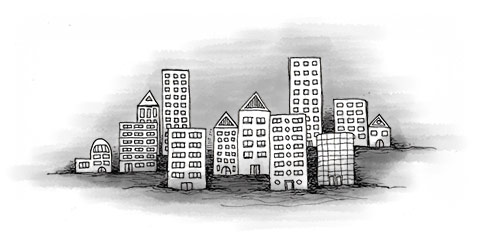However, the most significant factor affecting rents is the region of Italy, the city and the particular neighbourhood. Until recently, Italy had a fair rent ( equo canone) law that limited rents to those set by the local authorities rather than market levels. This resulted in a shortage of rental properties in some areas and owners are now permitted to set market level rents, which has encouraged more owners to let properties.
Most rents are negotiable and you should try to obtain a reduction. Sometimes an agent will suggest offering a reduced rent and even tell you what to offer. Rental payments are tax deductible for residents. The table below is a guide to current rents:
| Size of Property | Monthly Rental (€) |
| Studio (bedsitter) | 300 – 900 |
| 1 bedroom | 450 – 1,100 |
| 2 bedrooms | 650 – 1,500 |
| 3 bedrooms | 800 – 2,000 |
The above rents are for unfurnished, good quality, new or renovated properties in most rural and suburban areas. They don’t include properties in major city centres and popular resorts (such as the Alps, Italian lakes and resorts), exclusive residential areas or furnished accommodation, for which the sky’s the limit.
If you rent a property through an agent, you must pay the agent’s fee, typically around 10 per cent of a year’s rent or one month’s rental.
Provided rent isn’t paid in advance at more than two-monthly intervals, the landlord can ask for a deposit equal to one to three months’ rent. The deposit must be returned with interest within two months of the termination of the lease, less the amount due to the landlord for damages, redecoration, etc. Although it’s illegal, many tenants don’t pay their last few months’ rent and forfeit their deposit. Rent is normally paid one month in advance and you cannot be required to pay your rent by direct bank deposit.
In addition to rent, tenants in an apartment must have compulsory insurance and pay service charges. There will also be a set of house rules and regulations (regolamento), of which you should obtain a copy.
Service charges usually include such things as heating, hot water, rubbish removal, upkeep of grounds and gardens, use of lift, communal lighting and maintenance, and possibly a caretaker’s services. Other utilities such as gas, electricity and water are usually paid separately by tenants.
Always check whether rent is inclusive or exclusive of charges, which is usually stated in advertisements. Service charges are calculated monthly (payable with the rent) and are usually higher in a new building than an old one. They can vary considerably from as little as €20 to €200 or more per month. Ask to see a copy of the bills from the previous year.
You should also ask to see the bills for telephone and utilities (electricity, gas and water) and check that the previous tenant has paid the bills up-to-date, otherwise you could be liable for any debts.
This article is an extract from Living and Working in Italy from Survival Books.




